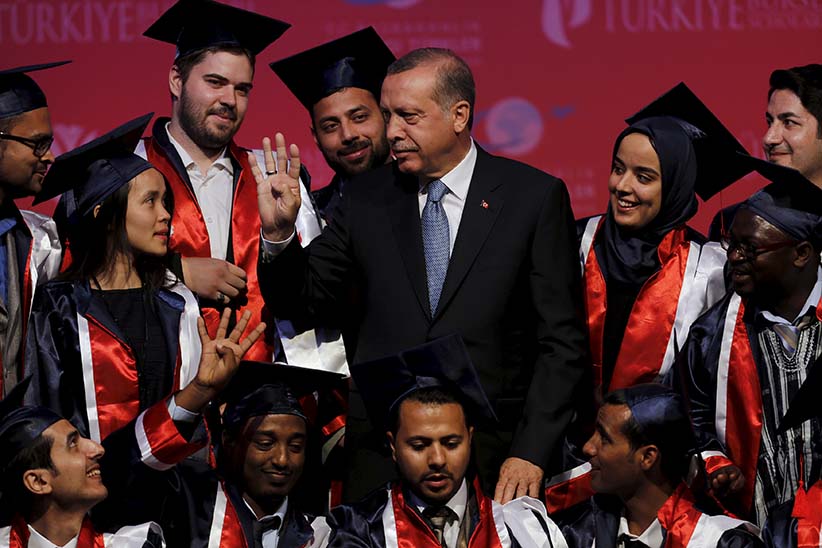Erdoğan 2.0: Behind the four-day makeover
Turkey’s president reinvents himself in the aftermath of a disastrous election
Turkey’s President Tayyip Erdogan chats with students during a graduation ceremony in Ankara, Turkey, June 11, 2015. President Erdogan on Thursday urged the country’s political parties to work quickly to form a new government, saying egos should be left aside and that history would judge anyone who left Turkey in limbo. In his first public appearance since Sunday’s parliamentary election, Erdogan said no political development should be allowed to threaten Turkey’s gains. He said he would do his part in finding a solution with the powers given to him by the constitution. (Umit Bektas/Reuters)
Share

It took three days, 22 hours, one minute and 45 seconds for Turkey’s President Recep Tayyip Erdoğan to reinvent himself. In the aftermath of a disastrous election on June 7 that reduced his favoured party—the Islamist-leaning Justice and Development Party, known by its Turkish acronym, AKP—to a parliamentary minority, Erdoğan, a publicity hound by nature, uncharacteristically disappeared from public view, retreating into his sparkling-new, 1,000-room presidential palace.
Turks waited for his response. The Hürriyet Daily News, an anti-AKP newspaper whose parent company, the Dogan Media Group, has been targeted by Erdoğan in recent weeks for reporting, among other things, allegations that Turkey’s intelligence services have been funnelling arms to Islamist militias in Syria, posted a clock on its website counting up the minutes, then hours and, finally, days of Erdogan’s hiatus.
When the president emerged on June 11, walking onto the stage at a graduation ceremony for university students in the capital, Ankara, he was a changed man.
Gone were the trademark rants of the firebrand political preacher Turks had come to love and despise in equal measure. In their place was a conciliatory politician few expected to see. “Everyone should put aside their egos and form a government as soon as possible,” Erdoğan 2.0 said, putting aside his usual divisive language and calling for a coalition government. “No politician has the right to say, ‘I.’ We have to say, ‘We.’ ”
Turks, no strangers to political intrigue, scratched their heads. This was the same man who, for years, had dabbled in dictatorship with astonishing ease—who, banking on an AKP election sweep, had promised to dismantle Turkey’s parliamentary democracy and replace it with an autocratic presidency.
That mission has failed, for now. But if Erdoğan is nothing else, he is a canny tactician. His survival now depends on adopting the image of the unifier tasked with preventing Turkey’s political collapse. It’s a smart play: If the attempts to form a coalition government fail, his demand for a presidency will look more enticing; if it succeeds, he can take the credit, shoring up his slipping popularity.
Whatever the outcome, it’s now looking as if Erdoğan’s four days of solitude were well spent.